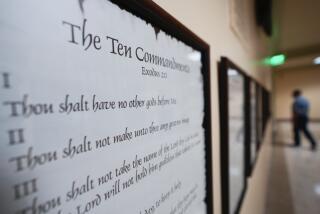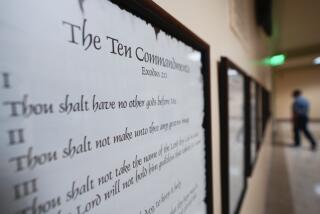The Mojave cross sits on public land -- or does it?
Today’s topic: Does the fact that the cross sits on a small patch of privately owned land -- which Congress transferred from public ownership to preserve the memorial -- protect the government in any way from claims that it is favoring one religion over others? Erwin Chemerinsky and Joseph Infranco finish their debate on Salazar vs. Buono, a case scheduled to be argued in the U.S. Supreme Court on Oct. 7. Click here for a backgrounder from the Pew Research Center.
Point: Erwin Chemerinsky, UC Irvine School of Law dean
Should there be a limit on religious symbols on government property? This is really the issue about which you and I fundamentally disagree, Joe. My view is that under the establishment clause of the 1st Amendment, the government, as much as possible, should be secular and therefore religious symbols do not belong on government property. At the very least, such symbols are not allowed if they would be perceived as an endorsement of religion or a particular religion.
You dispute that government should be secular and seemingly have no problem with any religious symbols on government property. Throughout this debate you have dismissed the establishment clause issue as being about nothing more than protecting the sensibilities of those who oppose religious symbols on government property. But by this notion, the 4th Amendment could be dismissed as being just about the sensibilities of those who don’t want their privacy invaded by illegal searches and arrests. The 1st Amendment’s protection of the free exercise of religion could be dismissed as no more than offending the sensibilities of those who want to practice their religion.
To the contrary: The establishment clause, as part of the Bill of Rights, should be read as creating an individual right to limit government support of religion and religious involvement in government.
My position is thus that a large cross in a federal park is an impermissible symbolic endorsement of religion. As the U.S. 9th Circuit Court of Appeals noted in 2007, before the case went to the Supreme Court, “The Latin cross is the preeminent symbol of Christianity. It is exclusively a Christian symbol and not a symbol of any other religion.” A person seeing a large cross in a public park would perceive it as a religious symbol.
Now to today’s question. After a court issued an injunction requiring removal of the cross from the Mojave National Preserve, Congress adopted a law transferring ownership to the Veterans of Foreign Wars (VFW). A U.S. District Court and the 9th Circuit both concluded that this was a sham transfer designed entirely to evade the prior injunction. The government cannot avoid abiding by the Constitution by transfers of public land to private hands, just as a city cannot avoid the requirement for free speech in public parks by transferring them to private control, and a state government cannot avoid the prohibition of cruel and unusual punishment in prisons by transferring the inmates to private jails.
The 9th Circuit noted that notwithstanding the transfer, control over the land and the monument still resided with the federal government. The National Park Service retains overall management and supervision of the preserve and of all national memorials. The cross is expressly designated as a “national memorial.” The government retains various rights of control over the cross and the property.
Moreover, if the cross violates the establishment clause, then government action to keep the cross is also unconstitutional. The 9th Circuit explained “that a reasonable observer, even without knowing whether Sunrise Rock is federally owned, would believe -- or at least suspect -- that the cross rests on public land because of the vast size of the preserve, more than 90% of which is federally owned.”
Moreover, allowing such transfers as a way of avoiding constitutional guidelines renders the establishment clause meaningless. A city could put a large cross atop its city hall and simply transfer ownership of the roof of the building to private owners.
It has been a pleasure debating you this week, Joe. Our disagreement is about something that far transcends this particular religious symbol. What should be the relationship between government and religion? I favor a wall that separates church and state and at the very least a limit on government endorsement of religion. You would impose no apparent limits on religious symbols on government property.
Ultimately, you are calling for a major change in the law that has prevailed for decades. As Justice Sandra Day O’Connor declared in voting to strike down a 10 Commandments display on government property, “Those who would renegotiate the boundaries between church and state must therefore answer a difficult question: Why would we trade a system that has served us so well for one that has served others so poorly?”
Counterpoint: Joseph Infranco, Alliance Defense Fund senior counsel
Thanks Erwin; I have also enjoyed our exchange. I think the primary difference between us is that I would allow symbols of our religious heritage in public, as we have done for centuries, while you wish to chart a new course to say they are never permissible. The Mojave Preserve memorial sat without controversy for decades, erected and maintained by the VFW to honor veterans. As you note, after the property became part of the national preserve, the ACLU filed this suit. Congress came up with a simple solution and voted to transfer about one acre to the VFW in exchange for a donation of five acres; clearly the value of the donated property was greater. In effect, Congress returned to the status quo to solve the ACLU’s “problem.”
The solution approved by a bipartisan vote in Congress (see many of those these days?) would have ended the issue. But the chronically offended plaintiff would have none of it. His hypersensitivity drove him to undermine a reasonable compromise and ensure the memorial’s destruction. In effect, when elected officials in Congress and millions of veterans disagree with one easily offended man, you say the offended man wins -- an extraordinary proposition. The 9th Circuit agrees with you, which may explain why it is by far the most overturned federal appeals court in the nation. Remember, this is the same court that forbade the Pledge of Allegiance in public schools before the Supreme Court reversed that decision.
If the ACLU’s true concern was a cross on public land, it would have been satisfied with the transfer to the VFW. Its claim is a clear pretext: The ACLU is relentlessly agenda-driven to impose its secular vision. It will settle for nothing less than the eradication of our religious heritage or anything that reminds us of religion.
Erwin, you have asked about how supposed establishment clause violations will be handled if the court agrees to roll back “offended observer” standing. Your question presupposes that the court is the only factor in the equation and consequently misses the most obvious response of all. We have three branches of government, and of the three the judiciary was meant to be the weakest. If you want the thoroughly secular government you describe, let it happen through the democratic process. This highlights a further difference in our philosophical approaches: You see the unelected judiciary as a vehicle to force societal change when the democratic process fails to produce your preferred goals. Perhaps this is the most significant underlying difference between our approaches.
Supreme Court Justice Antonin Scalia said in a recent interview: “The same Congress that proposed the 1st Amendment and the establishment clause also directed George Washington to proclaim a day of Thanksgiving, and his first Thanksgiving invocation was deeply religious. It was very nondenominational but deeply religious, invoking God. And that is our tradition. Some people believe the Napoleonic way -- what the French call le laicism and we call secularism -- is the right way. If they want, they can get the people to vote for it. But that has never been our way, nor is it in the Constitution.”
Erwin, you continually refer to developments of the last few “decades,” as if to say the question is settled, but omit consideration of the centuries that define the American experience. In truth, you propose a radically secular agenda that redefines the common bonds we have enjoyed as Americans. You also give the impression that there is some well-established permanency on standing and establishment clause limits, which is simply not the case. Remarkably, you have mentioned your involvement in the 2005 Van Orden vs. Perry case before the Supreme Court twice but failed to disclose that your position was rejected by the justices. The 10 Commandments memorial was found constitutional and still stands on the Texas state Capitol grounds, despite your client’s offended sensitivities.
In truth, the court has continually recognized the right to religious displays that commemorate our history; if you doubt this, read “In God We Trust” on a dollar bill. Congress and numerous state legislatures still open sessions with prayer, the Supreme Court marshal invokes God in each session, the White House recognizes a National Day of Prayer, state mottoes recognize God, and military chaplains of all faiths minister to those in harm’s way. Americans still remember their history and traditions. Incidentally, just days ago, another federal court threw out a Pledge of Allegiance challenge. How about crosses? Last year, a federal appeals court dismissed a similar lawsuit against the city of Las Cruces, N.M. The city seal has three crosses, commemorating the city’s history and name; fitting, because “Las Cruces” means “the crosses.”
I suppose the best way for me to close this discussion is to look beyond your rhetoric, which is mere wrapping paper, to the gift inside the box. What would the secular society you envision look like? It may not be your view, but secularists I know are publicly advocating government censorship of the word “Christmas” when referring to the holiday of that name. Another ACLU lawsuit is trying to shut down a Boy Scout camp on public property because the scouts’ oath mentions God.
This gives us a glimpse of your ideal society. Instead of celebrating our heritage and honoring each other’s holidays and traditions, we become petty and worry about the most easily offended among us. Government accommodation of religion is bedrock American history; our tradition of accommodation has given us liberties unparalleled in modern history. The dismantling of our history occurs one memorial at a time; let’s pray the court gets this one right.
More to Read
A cure for the common opinion
Get thought-provoking perspectives with our weekly newsletter.
You may occasionally receive promotional content from the Los Angeles Times.










